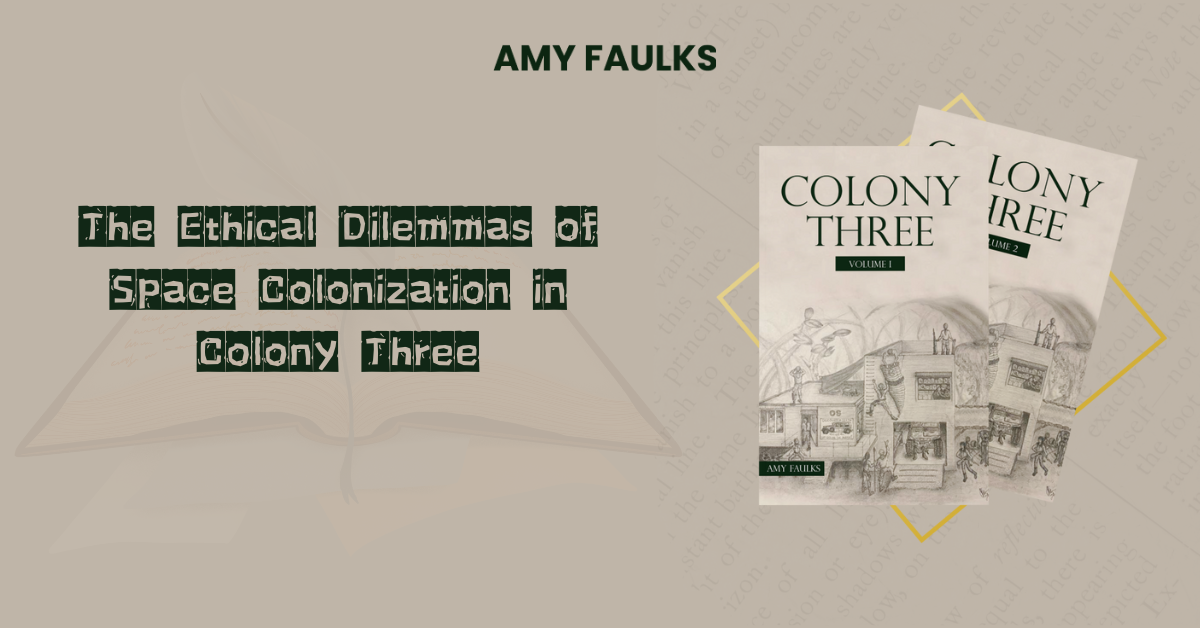The specifics of the story in Colony Three provide readers not only a great science fiction novel but also ask many ethical questions that emerge when people explore space. Cocooned against the extraterrestrial world of Arcadia, the novel provides readers with a high concept, albeit dark and realistic view of space colonization.
The Right to Colonize: Who Decides?
One of the central ethical questions raised in Colony Three is the legitimacy of colonizing a new world. Arcadia, with its uncharted terrain and alien ecology, becomes a battleground for survival and control.
The story introduces factions like Iron Sun, whose motives remain ambiguous, and the administrators of Colony Three, whose decisions are not always transparent. This dynamic raises questions about who has the authority to claim a planet and how these claims are justified. Is it survival, technological capability, or sheer ambition? Faulks invites readers to reflect on these pressing concerns through the lens of her characters’ struggles.
Resource Allocation and Survival
In Colony Three, the colonists face resource scarcity, forcing difficult decisions about allocation and priorities. The problems of rationing essentials such as food, water and medical supplies are problems that demonstrate the issue of equity in the novel.
The main role perhaps marking the concept of organization is that of Leslie, a pragmatic and powerful healer who makes difficult decisions about who is treated and who is not. These moments emphasize the moral dilemmas of survival: how to attend to the needs of the populace and have regard for the individual?
This theme runs parallel to real-life issues of resource utilization, when man considers harnessing resources of extraterrestrial planets or our own world.
The Consequences of Advanced Technology
Colony Three also addresses the ethical implications of advanced technology. From the mysterious weapons platform orbiting Arcadia to the hacked systems on the colony ship, Faulks demonstrates how technology can be both a lifeline and a threat.
The rogue drone, possibly linked to Iron Sun, symbolizes the double-edged nature of innovation. It raises questions about accountability and the unintended consequences of technological advancements. Can humanity ensure that its creations are used responsibly, or will they become instruments of destruction?
Conflict between Factions: Power and Morality
The novel’s depiction of conflicts between different factions highlights the intersection of power and morality. Each group—whether the colonists, Iron Sun, or Savant Inc.—has its own agenda, often clashing with others over control and survival.
This tension mirrors historical colonization efforts on Earth, where competing interests have led to exploitation, inequality, and violence. Faulks’ portrayal of these conflicts encourages readers to consider how similar dynamics might play out on a cosmic scale.
Respecting Alien Life and Ecosystems
Another feature of the colony is the perception of Arcadia as an alien world and the need to respect it. The alien flora and fauna as well as hostile creatures such as the centipede show that colonization entails dealing with utterly strange environments.
This part of the story brings forward the ethical issue of the selfish tendency of man to eliminate the extra-terrestrial beings. Is it right for humans to annihilate original environments for the paramount importance of survival, or should mankind vs nature exist in harmony? How?
A Reflection of Humanity’s Choices
Through its complex narrative and richly drawn characters, Colony Three offers a compelling exploration of the ethical dilemmas that accompany space colonization. From questions of legitimacy and resource allocation to the consequences of technological innovation, the novel challenges readers to think critically about humanity’s future in space.
As we stand on the brink of exploring new frontiers, Faulks’ work serves as a timely reminder of the moral and ethical responsibilities that come with such endeavors. Colony Three is not just a story about survival; it is a call to reflect on the choices that define us as a species.

